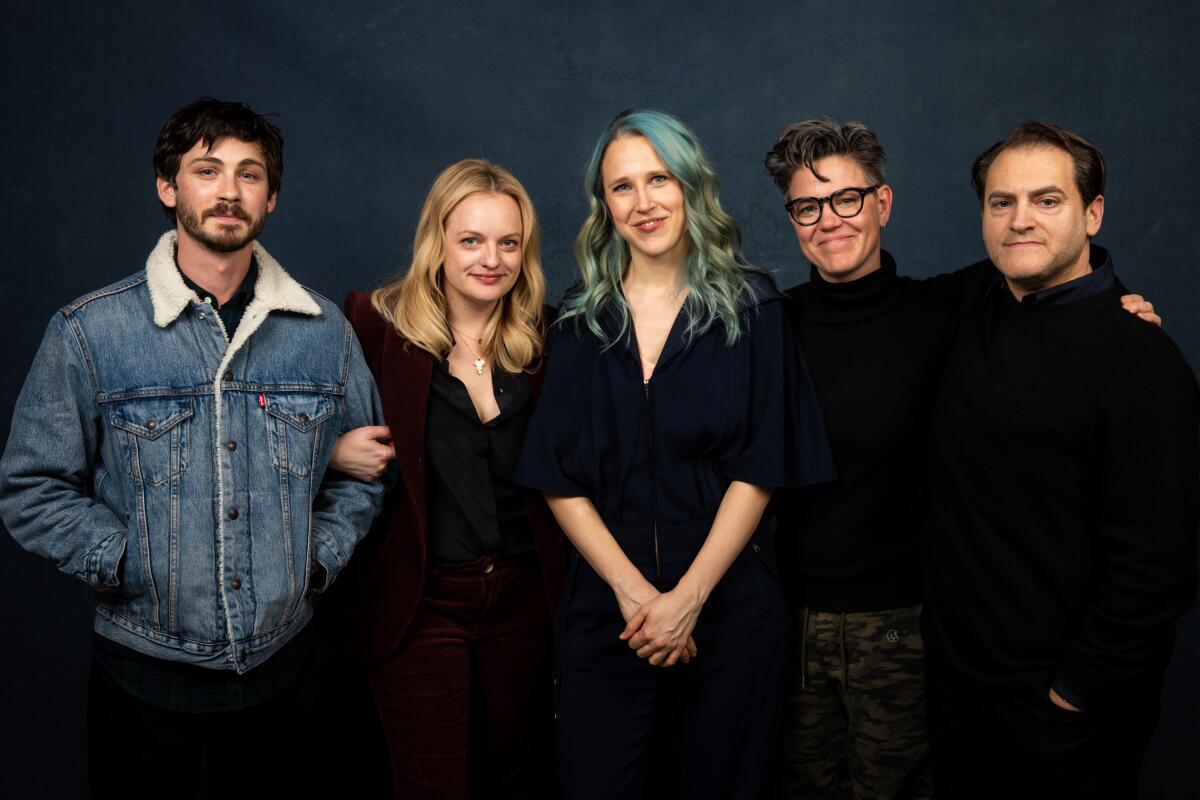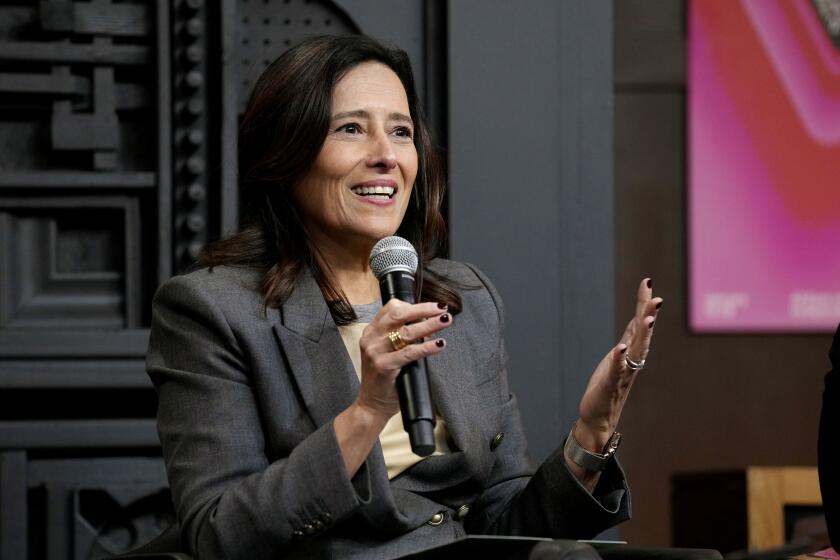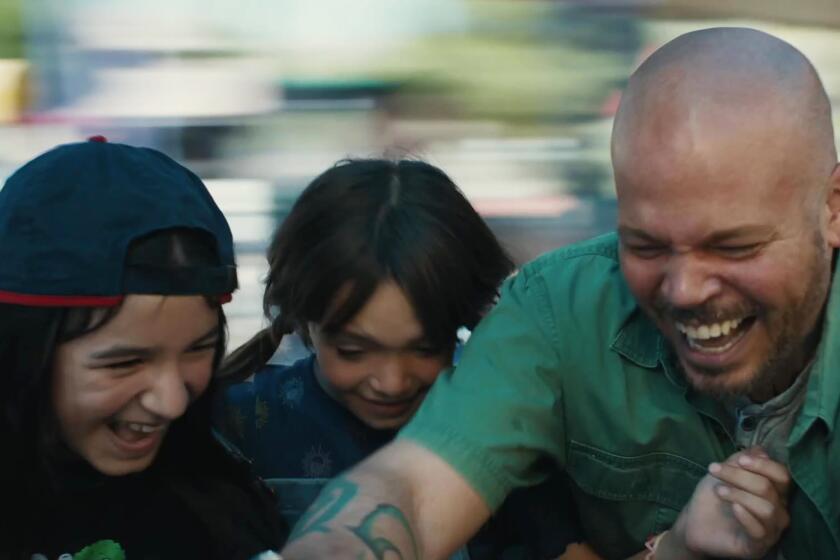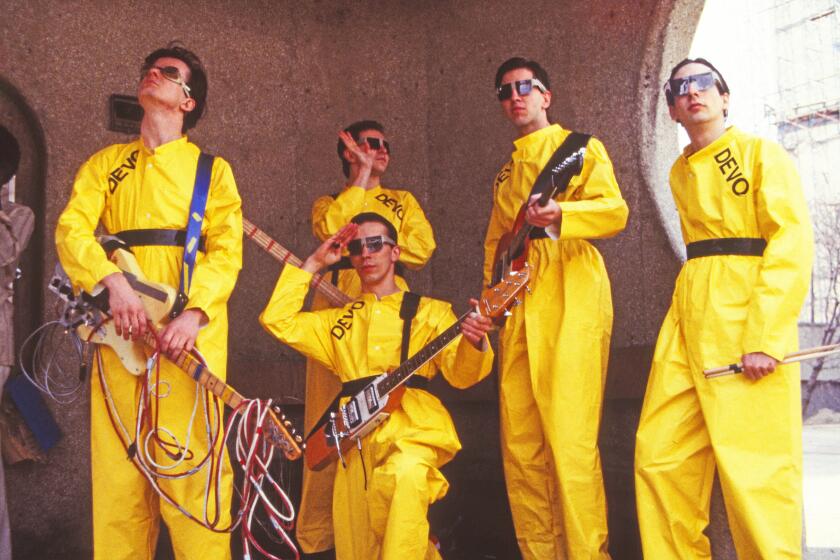Elisabeth Moss and Josephine Decker reveal ‘inner sorcery’ of Sundance premiere ‘Shirley’

Whether by fate or by luck, when director Josephine Decker was first sent the script for “Shirley” she was just in the middle of tearing her way through the work of author Shirley Jackson. Best known for her short story “The Lottery” and novels “The Haunting of Hill House” and “We Have Always Lived in the Castle,” Jackson’s writing combined a gothic sensibility with acute perceptions of a woman’s place in the world.
“As I was finding her work, she’s doing the thing that I am always trying to do in my art,” said Decker, “which is like, ‘have a strong structure.’ But then also that structure isn’t always about everything happening in reality. And she’s so good at developing a structure that continues to feel structured even as it descends into a surreal place. So anyway, yeah, I’m a big fan.”
“Shirley,” written by Sarah Gubbins based on the book “Shirley: A Novel” by Susan Scarf Merrell, has its world premiere at Sundance on Saturday afternoon. In the movie, Elisabeth Moss plays Jackson opposite Michael Stuhlbarg as her husband Stanley. The two are stuck in a codependent swirl, fueled by Shirley’s depression and agoraphobia and Stanley’s philandering and awash in their heavy drinking. Into their world comes a young couple, Rose and Fred Nemser (Odessa Young and Logan Lerman), who soon fall under the older couple’s sway. As he did for last year’s Sundance entry “The Souvenir,” Martin Scorsese serves as an executive producer, having seen Decker’s earlier film “Butter on the Latch.”
On Friday night, Decker and Moss were tucked into a corner of a resort restaurant in Deer Valley, not far from the festival’s hub in Park City. The two had not really seen each other since shooting the movie in the summer of 2018 and were happily catching up before an interview. At one point two members of the music group the Go-Go’s stopped by the table to ask if Moss would take a picture with the group, in town for the premiere of a documentary on their history. Moss happily obliged.
For Moss — a multiple Emmy and Golden Globe winner for her television work including “The Handmaid’s Tale” and currently a Spirit Award nominee for her performance in “Her Smell” — her part in “Shirley” presented what she called a “combo platter,” an opportunity to delve into the real life of Jackson, with the addition of a fictionalized dramatic elan drawn from her work. This is a story in which Shirley Jackson is a character, made in the spirit of her writing, but not a biopic of Shirley Jackson.
The script takes liberties with the timeline of Jackson’s life, including the details of when she wrote which of her stories, and omitting that she and Stanley had children together. Moss recalled conversations she had with Stuhlbarg before shooting, as they were both intensely researching their characters.
“At a certain point I think we both felt that we had to learn as much as we could and look like them as much as we could and sound like them as much as we could. But at the same time let it go in service of telling what Shirley would’ve wanted, which is the real story, the real truth of it,” said Moss.
For Decker, the explorations in “Shirley” of codependence and identity are perfectly in line with her own work, in particular her most recent film, “Madeline’s Madeline,” which premiered at Sundance in 2018. As Shirley draws Rose deeper and deeper into her world, possibly even making her a subject of a new work, the two launch into a destructive dynamic all their own.
“I think that what’s so exciting about what ‘Shirley’ was doing and I think what Sarah is doing is that it’s taking this kind of female ideal and makes it a bit more rich and more complicated,” said Decker. “So, it’s really a relationship between two halves of a consciousness. You know, I think it was really clear to her biographers that Shirley was always kind of writing about the two sides of her own mind.
“And I think that what’s cool about our movie, what’s really true to me, it’s like two sides of the one mind,” Decker said. “The movie, I hope, does a good job of flipping those roles so that the women become intertwined and start to not separate from each other but, like, integrate, which I think is [Shirley’s] goal: How can you integrate the different parts of yourself to become healthy?”
For Moss, also credited as a producer on the film, the character presented the opportunity to do something that had the ferocious underpinnings of much of her work, capturing the mercurial, unpredictable nature of Shirley Jackson’s personality that found expression in her writing.
“She would use parts of herself for different people, similar to an actor,” said Moss. “She would present a good side to someone and a bad side to another or just different good sides to different people, or she’d just be having a bad day or a bad week or a bad year.
“She just had all of these personalities and parts of herself that she would choose from,” Moss said. “Sometimes she’d be playing the part of somebody who had it together and sometimes she’d be the jealous girlfriend and sometimes she’d be the sexual, like, lover. She just had all these different things that she would play with depending on, honestly, what she needed, I think.”
In conversation, Moss is chipper and upbeat, a world away from the intense, complicated characters she has played on television in “The Handmaid’s Tale” or “Top of the Lake” or her collaborations with director Alex Ross Perry on movies such as “Queen of Earth” or “Her Smell.”
I just enjoy playing complicated people and happy people, generally, not as complicated.
— Elisabeth Moss, on what draws her to roles like ‘Shirley’
“I wish I could reveal stuff, that behind closed doors I’m actually like a really dark, complicated person, but I’m afraid that’s not the case. I think it’s much more boring than that,” Moss said. “I just enjoy playing complicated people, and happy people — generally — not as complicated. And I’m generally a happy person now. I’m not inhuman. I can have all the stuff that normally happens to humans, but as far as acting goes, it’s not as interesting to me to play my own emotions and my own life. I want to play things that are different from my life. That’s challenging. Otherwise, why don’t I just go live my own life?”
“Well also, working with you, I think it’s worth saying, maybe they’re not part of you, but there’s some secret thing that you access,” Decker said to Moss. “I think when you’re really going into a character, going into a role, I just felt like there were moments, and actually there were a lot of them, where it felt like you were turning on some inner sorcery, which maybe is appropriate for this film especially. But I think it’s something that’s actually really deep and that’s a deep, deep part of you that’s not so separate. I feel like you kind of have the sorcery, maybe not in everyday conversation, but it’s there. But I could be projecting.”
“I mean in order to play certain things there has to be a bit of a well that you can access, for sure,” said Moss. “I just think it’s really hard for me to analyze it. Like I hear that and I’m like, ‘That sounds right, yeah.’ It’s hard for me to think about it. Other people can be objective about it, I guess.”
Decker recently had her first child, and so the anxieties expressed in the movie over motherhood — Is it something I want? Will I be good at it? — could be seen as something personal to her. However, she said, the questions raised by the film had more to do with artistic creation and the toll it takes on one’s life.
“The thing that’s actually closer to my anxieties at the time was Shirley’s obsession with whether her creative project was going to work and how much she needed to abuse other people to make that happen,” Decker said, acknowledging that question was also a part of “Madeline’s Madeline.” “And so I really related to needing other people for your art, but maybe not knowing when are you manipulating them and when are you collaborating. That was kind of the question of my whole other film. I really love the struggle of the creative process.
“On the motherhood stuff, I never felt like that was a question Rose was necessarily asking herself,” said Decker. “In some ways what she was really asking herself was, ‘How much of me gets to continue to live in my relationship?’ And that could be with a partner, that can be with creative collaboration, it can be with a project. How much of you gets to exist there? For Rose in the movie, I think it was more about, ‘How do you fit in to the life that you’ve chosen?’ And are you satisfied with that?”
More to Read
Only good movies
Get the Indie Focus newsletter, Mark Olsen's weekly guide to the world of cinema.
You may occasionally receive promotional content from the Los Angeles Times.








